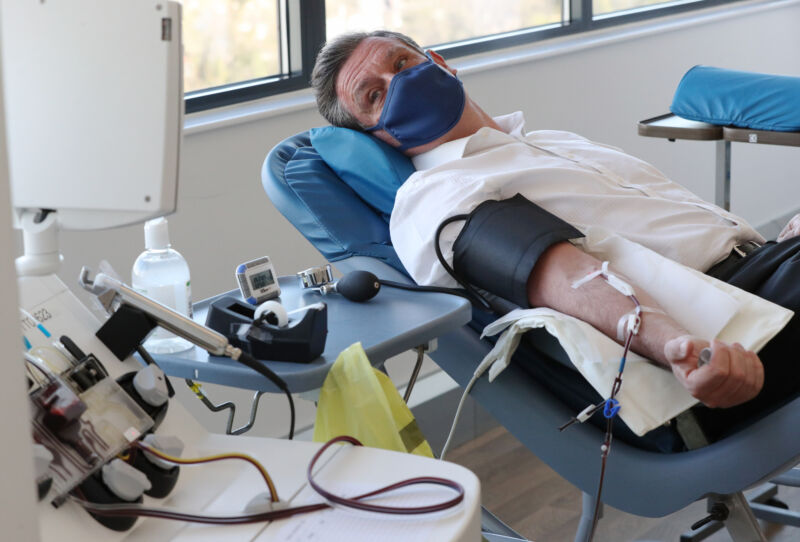
The COVID-19 pandemic is considered by many experts to be a mass disabling event. Though most people fully recover from a battle with the highly infectious coronavirus, a significant chunk of patients develop lingering, sometimes debilitating symptoms—aka long COVID. Estimates of how many COVID patients endure long-term symptoms can vary considerably. But the US Centers for Disease Control and Prevention recently estimated that nearly one in five COVID patients report persistent symptoms. With hundreds of millions of COVID-19 cases reported around the globe, even the more modest estimates would still suggest that tens of millions have lasting effects.
Yet, as those patients seek effective care, researchers are still scrambling to define, understand, and treat this new phenomenon. Many patients have reported uphill battles for finding care and relief, including long waits at clinics and few treatment options when they see a care provider.
Cue the quacks. This situation is ripe for unscrupulous actors to step in and begin offering unproven products and treatments—likely at exorbitant prices. It’s a tried-and-true model: When modern medicine is not yet able to provide evidence-based treatment, quacks slither in to console the desperate, untreated patients. Amid their sympathetic platitudes, they rebuke modern medicine, scowl at callous physicians, and scoff at the slow pace and high price of clinical trials. With any ill-gotten trust they earn, these bad actors can peddle unproven treatments and false hope.
There are already reports in the US of such unproven long COVID treatments, such as supplements, vitamins, infusions, fasts, ozone therapy, and off-label drug prescribing. But, a British investigation published this week highlights a growing international trend of pricy “blood washing” treatments.
Costly cleanse
The investigation, carried out by the British outlet ITV News and the British Journal of Medicine, revealed that thousands of long COVID patients are traveling to private clinics in various countries—including Switzerland, Germany, and Cyprus—to receive blood filtering or apheresis, which is not proven to treat long COVID.
Apheresis is an established medical therapy, but it’s used to treat specific conditions by filtering out known problematic components of blood, such as filtering out LDL (low-density lipoprotein) in people with intractable high cholesterol, or removing malignant white blood cells in people with leukemia.
In the case of long COVID patients, it seems apheresis treatments are used to remove a variety of things that may or may not be problematic. That includes LDL and inflammatory molecules, a strategy initially designed to treat people with cardiovascular disease. Internal medicine doctor Beate Jaeger, who runs the Lipid Center North Rhine in Germany and has started treating long COVID patients, touts the method, which involves filtering blood through a heparin filter. She also prescribes long COVID patients a cocktail of anticoagulant drugs.
Jaeger hypothesizes that the blood of people with long COVID is too viscous and contains small blood clots. She suggests that thinning the blood with drugs and apheresis can improve microcirculation and overall health. But there’s no evidence that this hypothesis is correct or that the treatment is effective. When Jaeger tried to publish her hypothesis in a German medical journal, it was rejected.
Robert Ariens, professor of vascular biology at the University of Leeds School of Medicine, told the BMJ and ITV that the treatment is premature. For one thing, researchers don’t understand how microclots form, if apheresis and anticoagulation drugs reduce them, and if a reduction would even matter for disease. “If we don’t know the mechanisms by which the microclots form and whether or not they are causative of disease, it seems premature to design a treatment to take the microclots away, as both apheresis and triple anticoagulation are not without risks, the obvious one being bleeding,” Ariens said.
False hope
Jaeger, meanwhile, defended treating patients despite a rejected hypothesis and a lack of evidence. She expressed anger over “dogmatism” in medicine and claimed to have treated patients in her clinic who arrived in wheelchairs but walked out. “If I see a child in a wheelchair suffering for a year, I prefer to treat and not to wait for 100 percent evidence,” she said.
And Jaeger isn’t alone; other clinics have also started offering apheresis for long COVID. The British investigation interviewed a woman in the Netherlands, Gitte Boumeester, who paid more than $60,000—nearly all her savings—for treatment at a new long COVID clinic in Cyprus after seeing positive anecdotes online. The woman, desperate for relief from her long COVID symptoms, signed a dubious consent form filled with spelling mistakes, grammatical errors, and half-finished sentences that waived her rights.
Daniel Sokol, a London barrister and medical ethicist, said the form would be invalid under English and Welsh law. “You can’t say, ‘By the way, you agree not to sue us if we cause you horrible injury or kill you, even if it’s through our own negligence,'” he told the investigators. “You can’t do that.”
At the Cyprus clinic, Boumeester received a battery of other unproven treatments along with the apheresis, including vitamin infusions, hyperbaric oxygen treatment, anticoagulants, and hydroxychloroquine, which is notoriously ineffective against COVID-19. After two months in Cyprus, subjecting herself to various treatments and draining her bank account, Boumeester said she’d seen no improvement in her debilitating symptoms, which include heart palpitations, chest pain, shortness of breath, and brain fog.
“I do think they should emphasize the experimental nature of the treatments more, especially because it’s so expensive,” Boumeester said. “I realized before I started that the outcome was uncertain, but everyone at the clinic is so positive that you start to believe it too and get your hopes up.”
https://arstechnica.com/?p=1866989

